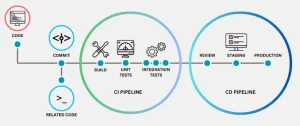12 . 06 . 2025
CI/CD: Automation that drives innovation and efficiency in software development
Discover what CI/CD is, how it works, and why it optimizes software development. Learn about its benefits and tools.
Table of contents
by Javier Saupurein (Cloud Analyst – Wezen Infrastructure)
In the fast-paced world of software development, efficiency and quality are essential. The practice of CI/CD (Continuous Integration and Continuous Deployment) has become a fundamental pillar to achieve these goals. By automating key processes, CI/CD enables development teams to identify bugs early, implement changes quickly, and maintain high quality in production.
In this article, we will explore in depth what CI/CD is, its importance, and how it works. In addition, we will discuss the benefits it offers, the tools available, and its relationship to DevOps.
What is CI/CD?
CI/CD is a methodology that automates the stages of software integration and delivery.
- Continuous Integration (CI) involves frequent merging of code changes into a shared repository, followed by automated testing to catch bugs early.
- Continuous Deployment (CD) automates the deployment of these changes to production environments, ensuring that the software is always in a deployable state. This practice reduces manual errors, speeds up the development cycle, and improves the quality of the final product.
Importance of CI/CD
The adoption of CI/CD is crucial for organizations seeking agility and efficiency in software development. By automating repetitive processes, human error is minimized and delivery of new functionality is accelerated.
This enables companies to respond quickly to market needs and maintain a competitive advantage. In addition, CI/CD fosters a culture of collaboration between development and operations teams, aligning goals and improving communication.
How does CI/CD work?
The CI/CD process consists of several stages:
- Development: Developers write and share code in a common repository.
- Continuous Integration (CI): Each code change is automatically integrated and undergoes automated testing to detect early bugs.
- Continuous Deployment (CD): Changes that pass testing are prepared for deployment in production environments.
- Deployment: Software is automatically deployed to production, ensuring fast and reliable delivery.
This automated workflow enables consistent delivery of value to the customer and continuous product improvement.

Benefits and impact on organizations
The implementation of CI/CD offers multiple benefits:
- Speed and agility: Accelerates the development cycle, allowing faster iterations and an agile response to market needs.
- Quality and reliability: Test and validation automation prevents regressions and reduces defects in production.
- Collaboration and transparency: Fosters collaborative work between development, operations, and QA teams, with real-time visibility into build status.
- Cost reduction: By detecting errors early and optimizing manual processes, rework and downtime are minimized.
- Continuous improvement: Enables the collection of metrics (build times, deployment frequency, failure rate) to identify bottlenecks and opportunities for improvement.
Solutions and implementation approaches
There are several tools and methodologies to implement CI/CD:
- CI/CD tools: Jenkins, GitLab CI/CD, GitHub Actions, Azure DevOps, among others.
- Pipeline as Code: Define build, test and deployment pipelines as versioned code along with the application.
- Infrastructure as Code (IaC): Automate provisioning and configuration of servers with Terraform, Ansible, or CloudFormation.
- Automated testing: Use feature flags to progressively and securely enable or disable new features.
- Monitoring and observability: Integrate real-time metrics and logs (Prometheus, Grafana, ELK) to react to incidents.
The choice of tools and approaches will depend on the specific needs of each organization and its level of DevOps maturity.
How do CI/CD and DevOps relate?
CI/CD is an integral part of the DevOps methodology, which seeks to improve collaboration between development and operations teams. Both practices focus on automating processes to streamline software delivery and improve software quality.
While DevOps encompasses a broader culture and set of practices, CI/CD provides the specific tools and processes to achieve continuous and reliable delivery.
Together, these methodologies enable organizations to respond quickly to market changes and deliver consistent value to their customers.
Why choose Wezen as a strategic partner for CI/CD?
Wezen offers a customized approach to CI/CD implementation, adapting to the maturity and needs of each organization.
Our team of DevOps consultants has extensive knowledge in hybrid and multi-cloud environments, which allows us to offer efficient and scalable solutions.
In addition, we provide post-implementation support with periodic reviews of metrics and optimizations, ensuring continuous improvement in software development and delivery processes.
By choosing Wezen as a strategic partner, organizations can accelerate their digital transformation and stay competitive in a constantly evolving market.
In other words, the adoption of CI/CD is essential for organizations seeking to improve the efficiency, quality and speed of software development. By automating key processes and fostering a culture of collaboration, CI/CD enables companies to respond quickly to market needs and deliver consistent value to their customers.
With the support of a strategic partner like Wezen, CI/CD implementation becomes an efficient process tailored to the specific needs of each organization. We can help you, Write to us.


